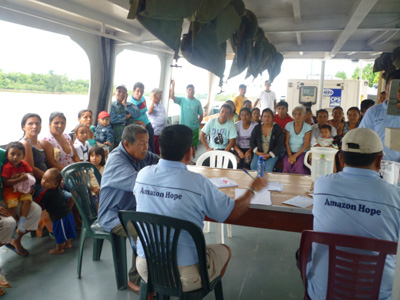After spending the last four years studying Dentistry, I have spent two weeks travelling down the Amazon River providing Dental treatment as part of my dental elective (clinical work, research or dental observation which is then presented to a board or examiners). I knew my elective would be a great opportunity to put the skills I have learnt to good use. After doing a lot of research on various humanitarian projects, I came across the Amazon Hope Mission which is run by the Vine Trust. The Vine Trust is a Christian Charity that provides various services with the vision to transform many communities around the world. As a Christian, this was the perfect choice as it combined my faith and the chance of gaining valuable dental experience by providing treatment to people who desperately needed it.

I took part in their Amazon Hope project which works alongside Scripture Union Peru. They have two boats which go out alternately every two weeks for ten days at a time. There are several villages situated along the Rio Tigre, south of Iquitos, Peru. These frequent trips mean that each village is able to be visited by a boat every three months. On board the boat there was a crew of twenty nine people; a team of nine UK volunteers and twenty Peruvian staff. This comprised of doctors, nurses, a dentist, me and two other dental students as well as translators, kitchen staff and the crew. The boat contained a dental surgery fitted with two chairs, three doctors' surgeries, a pharmacy and a lab.
My trip began with a flight to Lima, the capital of Peru, followed by a flight north to Iquitos. We spent three days in Iquitos allowing us to get a feel for the place and to see other projects run by the Vine Trust. A trip highlight was visiting an orphanage which housed forty two boys (we were told its maximum capacity is supposed to be forty children) ranging from four to seventeen years of age. The boys receive an education as well as being taught about God and Christian values. The family that run the orphanage also live there and their aim is to emphasise to the boys the importance of a good loving family, which some have never known, to stop the cycle of abuse, neglect and brokenness being passed down through generations. There was a lovely atmosphere around the orphanage and to see the hard work carried out by the family, highlighted by all the happy faces of the children, was amazing.
After our brief time in Iquitos it was time to board the boat which would become our home, place of work and place of worship, for the next ten days. Each day took on a similar format; up for devotion at 7am, breakfast at 7.45am, tour of the village until 8.50am, followed by dental and medical treatment which began at 9am. If the village had a large population we would stay and treat patients there all day, if smaller, we would journey onto another close by village at lunch time and treat there in the afternoon. Beginning the day with devotion as the light from the sun began to spread across the Amazon was a true blessing and an experience I will never forget. Our songs of worship, sung in Spanish, echoed out as the villagers made their way to or just passed by, the boat.

Over the course of the ten days I treated seventy patients, as did my fellow dental students, under the guidance and supervision of Dr Carlos (know to us as DJ Carlos for his love of playing music in the dental surgery). The Bible tells us that the greatest fruit of the Spirit is love and Dr Carlos along with the other crew members exhibited this every day. The work consisted mainly of extractions and two or three fillings a day, with the main objective being to get the patients out of pain. Although the villages are remote they receive supplies from a ship, which now has a supply of sugary drinks and snacks readily available. In particular, Inka Cola is extremely popular in Peru. Oddly, it tastes the same as Irn Bru (a well known Scottish drink) but boasts a colour of luminous yellow, which the children love. It seems nowhere in the world is immune to a shift in diet to one which is rich in sugar. This has led to a lot of the population missing many teeth from a young age, unfortunately a familiar sight I have witnessed in some deprived areas of Glasgow. The villagers were all very grateful for the dental and medical care we were able to provide and accepted the dental treatment with little fuss, which I very much appreciated. Once all the patients had been seen we had a couple of hours to play with the children or play football against the village team before the sun set. It became apparent that although these children had very little in terms of possessions, they exuded happiness and laughter was a common sound during our time with them.
The trip really was an amazing experience and I am thankful I was able to help some of the people from the remote areas of the Amazon. I very much look forward to going back again once I have qualified to provide more treatment as well as aiding prevention through education on oral hygiene. All in all it has been the experience of a lifetime and one I will never forget.






























